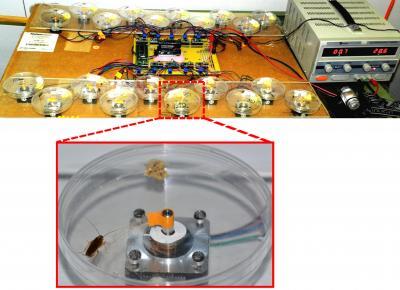To speed up reproduction, there's no substitute for the tender touch of a live cockroach.
That's the major takeaway from a North Carolina State University study examining whether artificial antennae – in this case, duck feathers – can mimic a cockroach antenna's capacity to hasten reproduction in cockroach females.
Female cockroaches that get "touched" – by other female cockroaches and, under certain conditions, even by duck feathers that mimic roach antennae – reproduce faster than female roaches that live in isolation or without tactile stimulation.
Pairing two cockroaches together – even roaches of different species – speeds up reproduction the most.
"To understand the mechanisms behind tactile stimulation and reproduction, we devised a motor-driven system using duck feathers as stand-ins for cockroach antennae. We found that these artificial antennae worked to stimulate certain hormones that speed up reproduction in the female German cockroach," says Dr. Coby Schal, Blanton J. Whitmire Professor of Entomology at NC State and the senior author of a paper describing the research. "We also found that the shape of the artificial antenna doing the 'touching' and the speed and duration of the stimulation were key factors that influenced reproduction speed."

Motorized tactile stimulation system shows the power supply (right), controller (center) and 20 Petri dishes mounted on a stepper motor. Inset shows an isolated female cockroach in a Petri dish with a duck feather mounted on the rotating motor shaft.
(Photo Credit: Adrienn Uzsak)
Female cockroaches gain the capacity to produce eggs when they become adults, so reproduction speed can be described as the duration of time between the onset of adulthood and the first bout of egg-laying. Stimulating juvenile hormone production in adult female cockroaches accelerates growth of their eggs. When the eggs grow to a certain size, female cockroaches lay the eggs. Faster egg growth, therefore, translates into faster egg-laying. Differences between speedy reproduction and slower reproduction could be several days. And speedy reproduction leads to bigger infestations.
To elucidate the role that tactile sensation plays in reproduction, the researchers, led by first author Adrienn Uzsak, a former Ph.D. student in Schal's lab, performed a number of experiments. Throughout all the experiments, the researchers showed that isolating female roaches, or exposing them to dead roaches, slowed the reproductive process.
Isolating a female cockroach in a Petri dish while allowing another cockroach's antennae to protrude into the dish sped up reproduction greatly, but cutting the interloper's antennae down to nubs stifled reproduction speed to that of roaches in isolation.
The researchers also developed a motorized chamber that rotated a duck feather inside a Petri dish to act as a surrogate roach antenna. The researchers changed both the speed of the rotating feather and the duration of stimulation. Short bursts of stimulation with slow motor speeds led to faster reproduction, while longer stimulation bouts with a fast-moving feather slowed reproduction.
Finally, the researchers used different types of duck feathers in the motorized chamber, contrasting longer, barbed feathers with shorter, unbarbed feathers. Longer, barbed feathers stimulated faster reproduction.
"In studies over the years, we've learned how challenging it is to pinpoint the role of tactile stimulation in reproduction, although we knew from the start that it was important," Schal said. "Now we've learned that, under the right conditions, artificial antennae – including some that are quite different from cockroach antennae – can speed up reproduction, clarifying the importance of antennal contact and the role of antennal movement. Now that we have an experimental approach for consistent tactile stimulation, our next challenge is to understand how these stimuli cause females to produce more of the hormone that accelerates reproduction."
Source: North Carolina State University